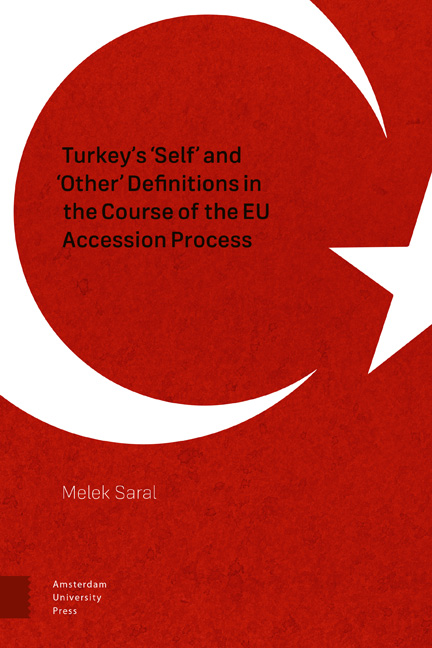Book contents
- Frontmatter
- Contents
- Acknowledgements
- Abbreviations
- 1 Socialization or Estrangement within the Framework of Turkey-EU Relations
- 2 The Concept of Socialization and Identity Change
- 3 New Phase in Turkey-EU Relations: Opening the Door to Europeanness
- 4 The Helsinki Summit: The Recognition of (Muslim) Turkey’s Europeanness
- 5 Start of Negotiations, End of Negotiations
- 6 New Area, New Identity, New Roles: Turkey – European or Middle Eastern?
- 7 Results and Implications
- Bibliography
- Index
5 - Start of Negotiations, End of Negotiations
Published online by Cambridge University Press: 12 February 2021
- Frontmatter
- Contents
- Acknowledgements
- Abbreviations
- 1 Socialization or Estrangement within the Framework of Turkey-EU Relations
- 2 The Concept of Socialization and Identity Change
- 3 New Phase in Turkey-EU Relations: Opening the Door to Europeanness
- 4 The Helsinki Summit: The Recognition of (Muslim) Turkey’s Europeanness
- 5 Start of Negotiations, End of Negotiations
- 6 New Area, New Identity, New Roles: Turkey – European or Middle Eastern?
- 7 Results and Implications
- Bibliography
- Index
Summary
In December 2004, Turkey's constant efforts to initiate political and legal reforms, especially in the areas of human rights, and to demonstrate a strong political will to upgrade and deepen its parliamentary democracy were considered successful enough by the European Council that they announced that Turkey had met its political criteria and consequently full accession negotiations would begin on 3 October 2005. This was a turning point for Turkey and EU relations. EU actors appreciated the need to sustain Turkey's ongoing reform process over the course of the negotiations. The EU had a continuing role in determining Turkey's reform priorities through updated Accession Partnerships, in monitoring compliance through the Commission's progress reports, and in threatening to suspend negotiations in the event of any stalling or backsliding in the reform process. Everything seemed in place for a successful socialization process. The 2005 Progress Report on Turkey stated that, despite the slower pace of reform and remaining problems with implementation, Turkey was continuing to fulfill the Copenhagen criteria (European Commission 2005a). In October 2005, the Council approved a framework for EU accession negotiations. In January 2006, the third accession partnership (Council of the European Union 2006) was signed and the screening process was completed by 12 October 2006. However, during 2005, and more accurately in 2006 and 2007, signals from both Ankara and Brussels indicated that relations were slipping dangerously back into the former vicious cycle. In Turkey, reform momentum slowed only a year after the official launch of negotiations, which risked serious derailment. Parallel to the worsening relations with the EU, public support also started to decline. A majority of Turks believed that Turkey would enter the EU within three years. However, they soon found out that this would not be possible for fifteen years, and even then was not assured. The Cyprus, Armenian, and Kurdish problems could cause an extension beyond fifteen years. This influenced the attitudes of the Turkish people toward the EU. According to Pollmark Research, for the first time, the opponents of the EU reached 30% of the population (İnce 2005). The research carried out by A&G (between 23-24 September in 32 cities among 2408 participants through face-to-face interviews) in 2006 found the number of people willing to join the EU had declined dramatically.
- Type
- Chapter
- Information
- Publisher: Amsterdam University PressPrint publication year: 2017



